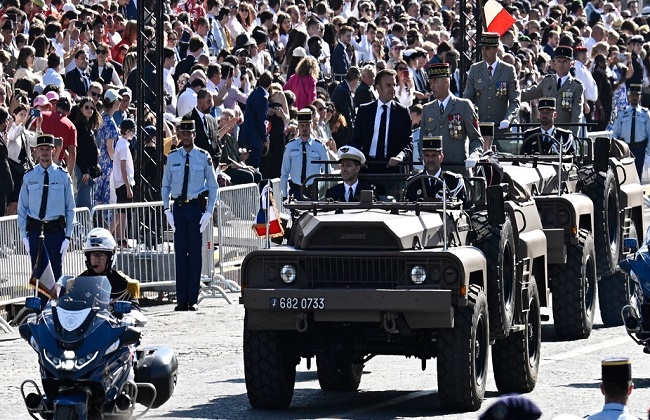
France does not know where its government is headed and the armed forces also took an unusual detour at the start of their annual Bastille Day march on Sunday.
Preparations to host the Olympic Games blocked the national day parade from its traditional route on the Champs Elysees, and a smaller military contingent will instead march on the nearby Avenue Foch — one of the most prestigious streets in Paris and one of the most expensive addresses in the world.
This will not be the only unusual feature of the event: France is also without a government, less than two weeks before the Games.
All eyes will be on the host, President Emmanuel Macron, who last year cut a more impressive figure, hosting rising superpower India’s Prime Minister Narendra Modi at France’s triumphant national day parade.
But, with the Olympics just around the corner, France has no international star guest for this year’s parade — and French political leaders’ minds will be elsewhere, pondering the power vacuum.
This month’s snap elections, called by Macron to clarify France’s direction after the far right sent shockwaves through the political establishment by coming first in European polls, left the country without a ruling minority.
Prime Minister Gabriel Attal is hanging on as caretaker head of government but the centrist Macron ally is now focusing on his own future, taking charge of his reduced party in parliament.
Other figures are mobilising with an eye on the 2027 presidential race, but there is little sign of a ruling majority emerging from parliament, split between three loose camps.
With the government in limbo and Macron barred by the constitution from calling fresh elections for 12 months, far-right figurehead Marine Le Pen is eyeing the 2027 race with relish.
Meanwhile, first place in the elections was claimed by a rapidly cobbled-together left-wing alliance, the New Popular Front (NFP), which now has the most MPs but no clear candidate for PM.
Firebrand hardliner Jean-Luc Melenchon and his France Unbowed (LFI) party have alienated many even on the left, while the centre and right say they would not welcome his MPs into a coalition.
The European Union’s second largest economy, a nuclear-armed G7 power and permanent member of the UN Security Council, is thus rudderless, a troubling situation for markets and France’s allies alike.
Against this backdrop, the reduced and rerouted parade risks becoming a new symbol of drift, even with the addition of the arrival in Paris of the Olympic Torch, ahead of the July 26 to August 11 Games.
No tank or armoured vehicle will take part, and only 4,000 foot soldiers will march, down from 6,500 last year, but the military fly-past will see 45 aeroplanes and 22 helicopters soar over Paris.
Regiments honoured on the parade will include those from France’s allies and former French colonies that took part in the country’s 1944 World War II liberation 80 years ago.
The parade’s final section will also honour the Olympic spirit.
Colonel Thibault Vallette of the elite Cadre Noir de Saumur cavalry school and 2016 equestrian gold medallist in Rio will be bringing the torch down the route before relay runners carry it around the capital.

